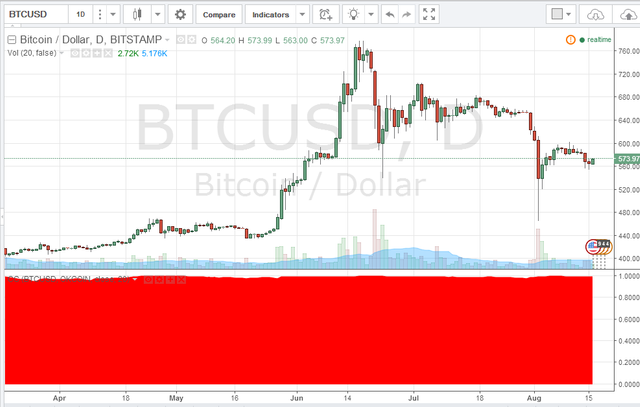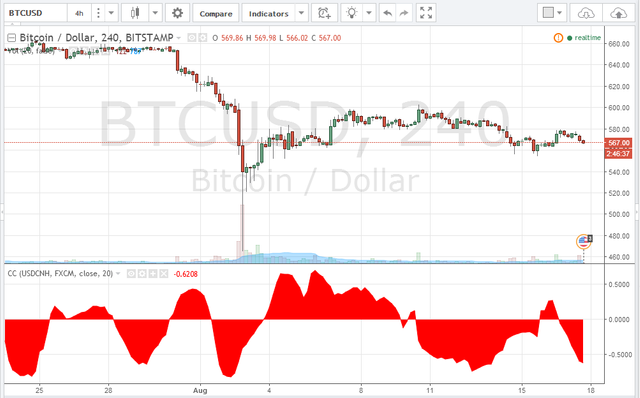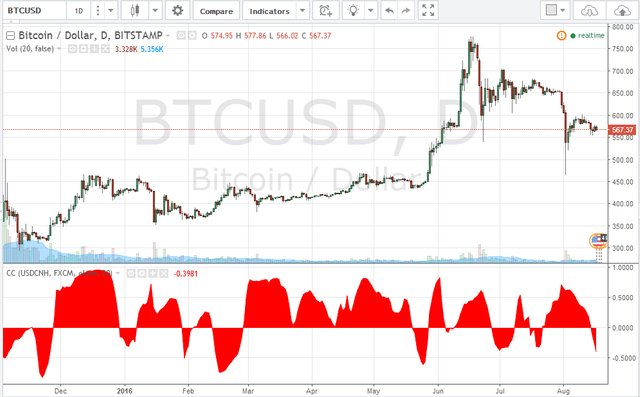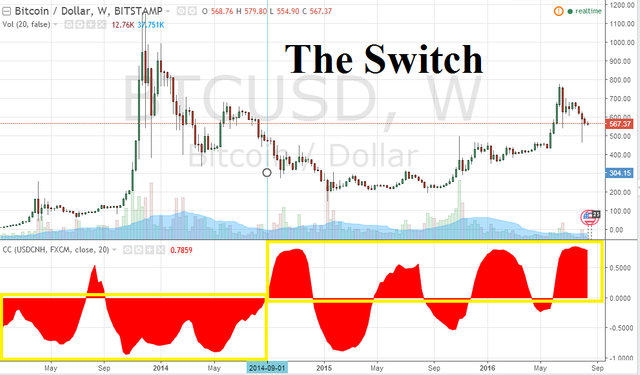Countless news articles and posts on reddit are alluding to a relationship between Bitcoin and the Chinese Yuan. It's hypothesized that the relationship is there because Chinese investors are using BTC as a means to circumvent currency controls in China. But does this relationship exist and if it does, how strong is it? Let's find out!

I will be using the same method of examining correlations as in this previous post. https://steemit.com/trading/@forextrader/3-steps-to-see-correlation-between-any-2-trading-instruments-on-tradingview
The two instruments we will be looking at are BTC/USD (BitStamp price feed) and USD/CNH. We are using a European exchange like BitStamp and not OKCoin for example to avoid Chinese trader sentiment influencing the data further. Although as you can see in my correlation post above and the pic below, prices on the two exchanges move neck in neck most of the time.

We use USD/CNH which is the US Dollar versus the Chinese Yuan offshore rate. This is the freely traded currency unlike USD/CNY, the onshore currency rate. The onshore rate is tightly controlled with it's value only allowed to move in a certain band around the daily PBOC fixing. The offshore rate technically trades freely in Honk Kong but the Bank has been known to make large interventions in that market as well. Nonetheless it's better to chart something that trades somewhat free compared to not free at all. Enough talk, chart time!
On the first picture below we see BTC/USD with the Correlation Coefficient plotted as a red histogram on the bottom. We will examine multiple timeframes, starting with the 4H chart. Is there correlation on the lower timeframes? Chart says NO. Notice how in the past 30 days the value of the CC Indicator keeps moving from negative to postitive territory. There is no consistent relationship to note here.

Our second chart below is the daily timeframe. Here things start to get interesting. The red histogram spent most of 2016 predominantly on the positive side, peaking at over .80 in March, April and June. This signals weak to strong positive correlation. This means that as the Yuan weakens and the USD/CNH moves up, BTC/USD moves up as well.

This is a very significant finding because the normally you would expect the opposite to happen. Because these two pairs share a USD component, as the Dollar gains versus the Yuan and USD/CNH moves up, then (ceteris paribus) BTC/USD should decline. What the chart above demonstrates is that for the past year the BTC vs Yuan correlation has been so strong that it overpowered the USD element of the equation.
But one year does not make a trend. Let's examine how far back does this positive correlation go. Our next chart below is of the weekly timeframe. Here we can see that before August/September of last year, this correlation was negative! Notice how the histogram spends most of the time below the 0 figure. Then after 'the switch' in August/September happened, BTC/USD and USD/CNH started to move together!

One does not need to look hard to find the reason behind the switch. On August 10th 2015 China rattled currency markets by weakening the Yuan by 1.9 percent, the biggest value in two decades. In the months that followed, the PBOC continued to slowly devalue the Yuan.
The Verdict: Yes Bitcoin and the Chinese Yuan are correlated. A weaker Yuan correlates to a stronger Bitcoin. But the correlation is a direct result of Chinese devaluation and not a persistent phenomenon. Furthermore it's not clear if the opposite is true i.e. does a strengthening Yuan lead to lower Bitcoin prices? We currently don't have much data to examine this because the USD/CNH has been on a consistent uptrend during the past 12 months. It appears that on the lower timeframes there is no correlation.
Please follow me here https://steemit.com/@forextrader
In my next post I will be covering the correlation between Ether and Bitcoin.
I did a little screw up in the final chart, the switch line should've been in August 2015 not 2014. I spent a lot of time on this post, so don't feel like changing it. Just keep that in mind.
Downvoting a post can decrease pending rewards and make it less visible. Common reasons:
Submit